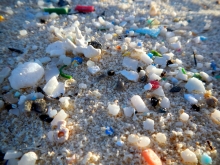
By: Demi Fox, Northeast Regional Coordinator for the NOAA Marine Debris Program
We’re spending March talking all about marine debris and its types, sources, impacts, and solutions. Tune in throughout the month to learn more about this important topic and how we can all be part of the effort to make our lives and our ocean #DebrisFree.
Marine debris is a serious threat to marine animals. While large pieces of litter can have dramatic impacts on marine animals, less obvious are the dangers of plastics measuring less than five millimeters in size, known as “microplastics.” These small pieces of debris have quickly become a high research priority for scientists around the world. Microplastics enter the marine environment from a variety of sources: microbeads in cosmetics, microfibers washed from our clothing, and plastic fragments degraded by the sun, among many others. The threats they pose depend on their quantity, chemical composition, location in the ocean and the water column, and availability for ingestion. Despite its small size, microplastic debris is affecting some of the planet’s largest animals.